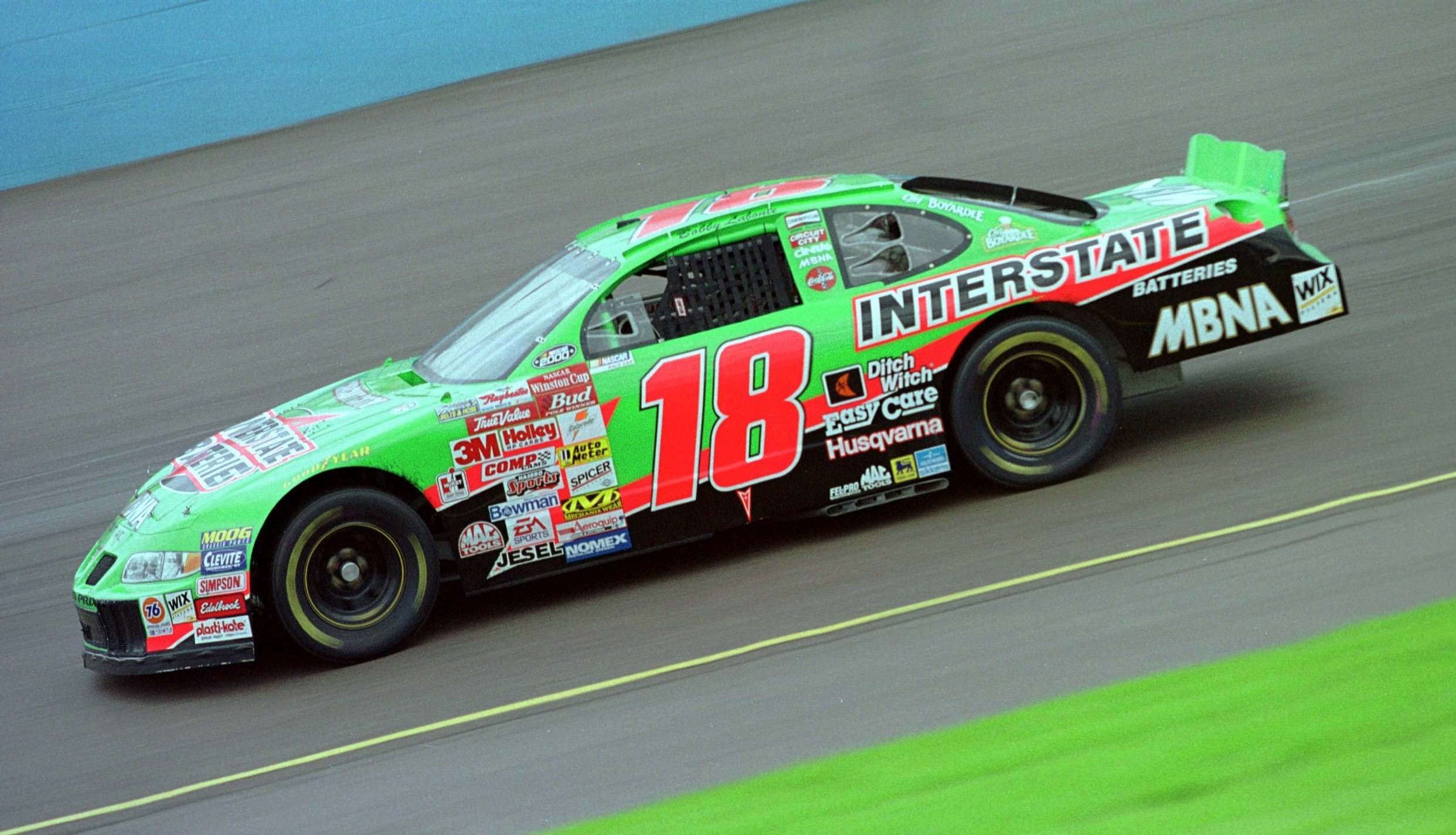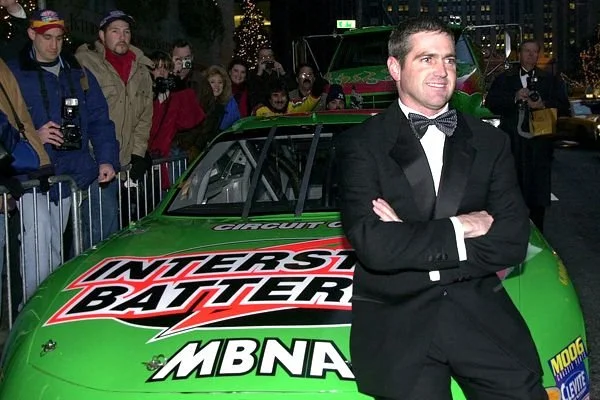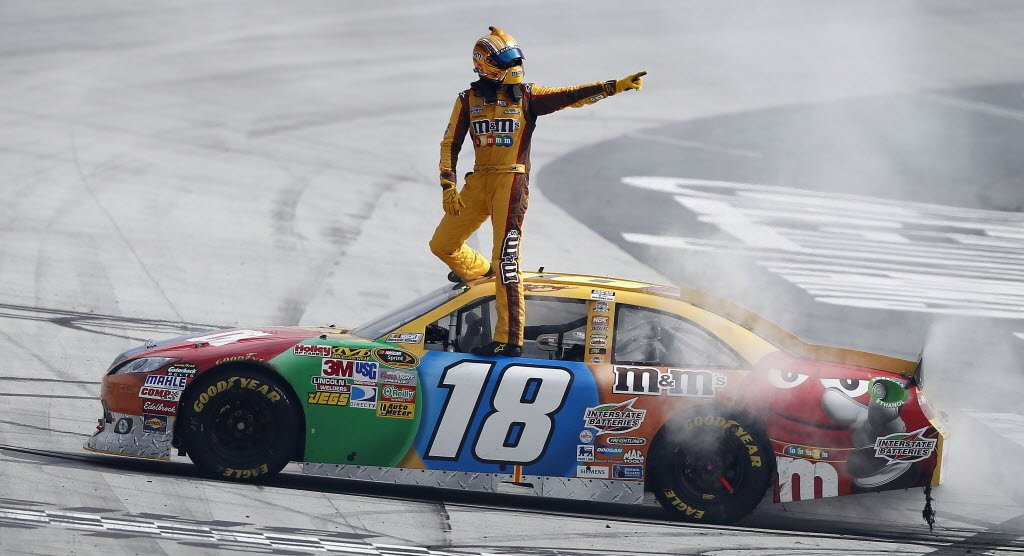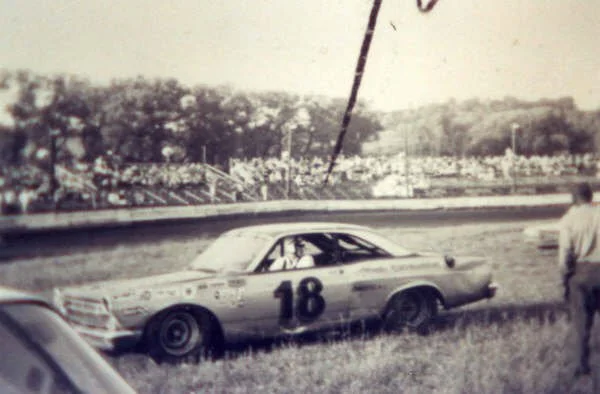
In NASCAR Cup Series competition the #18 car has started 1,539 races and has 79 wins, 56 poles, 346 top 5s, 597 top 10s, and 384 DNFs.
Dale Jarrett drove the #18 car for 2 different owners in his career for a total of 113 starts and 2 wins. In 1987 Jarrett finished 2nd in the Rookie of the Year standings to Davey Allison driving Eric Freelander’s unsponsored #18 Chevy. Joe Gibbs Racing debuted at the 1992 Daytona 500 with Dale Jarrett driving the #18 Interstate Batteries Chevrolet Lumina to a 36th place finish after a crash. The team improved dramatically the next year when Jarrett won the Daytona 500 while his father Ned Jarrett called the finish for the CBS broadcast, a moment now known as “The Dale & Dale Show.” That year he finished a then career-high 4th in points. Jarrett won a race at Charlotte but he slipped to 16th in points in 1994, and moved to Robert Yates Racing’s famed 28 car for 1995.
Bobby Labonte has 375 starts in car #18 from 1995-2005 including 21 wins and the 2000 Winston Cup Championship.
In 1995 Labonte won 3 races, sweeping both Michigan events and winning at Charlotte, finishing 10th in points. This would mark the beginning of a decade of success between Labonte, Joe Gibbs Racing, and Interstate Batteries. In 1996 the team struggled to win until the season finale at Atlanta and finished 11th in points.
In 1997 the team had a similar year to the previous but managed to improve to 7th in points. Their lone win came at the season finale. The team improved in 1998 by winning races at Atlanta and Talladega en route to 6th place in points. 1999 was a breakout year for the 18 team. They scored 5 wins which came at Dover, Michigan, Atlanta and both races at Pocono. The team came just short of the championship and finished 2nd in points to former driver Dale Jarrett, once again at Atlanta. The team continued their success in the next season, winning the second race of the season at Rockingham. Labonte’s next win was the Brickyard 400 at the famed Indianapolis Motor Speedway. His third win came at the Darlington Southern 500, recovering from a hard practice crash and taking the lead on a late race pit stop to win the rain and darkness shortened event. His fourth and final win of the year came at Charlotte a month later, though the team barely missed another win at Atlanta . Labonte would hold the points lead for 25 consecutive races to win the 2000 NASCAR Winston Cup Series Championship.
The team faced disappointment in 2001 after high expectations following the championship season, winning only 2 races at Pocono and Atlanta and finishing 6th in points. 2002 was the team’s worst year since Labonte joined the team, scoring only one win at Martinsville and finished a disappointing 16th in points. The team rebounded in 2003 scoring 2 wins at Atlanta and Homestead to finish 8th in points. Even though the team made some progression in 2004, the team fired crew chief Michael “Fatback” McSwain midseason, with Brandon Thomas taking over for the rest of the year. The team went winless to finish 12th in points. Steve Addington, a Gibbs Busch Series crew chief, was named new crew chief for the 2005 season, but a rash of troubles, some caused by mechanical problems, continued to daunt the team. The high point of the year was the Coca-Cola 600 , when he finished second to Jimmie Johnson by half a car-length. Labonte finished 24th in the championship standings, and the team’s regression led to his departure following the end of 2005. Bobby Labonte earned all 21 of his career Cup Series wins in the car, as well as the Winston Cup championship in 2000. He would depart for the 43 car of Petty Enterprises.
After Labonte’s departure, Gibbs announced that JGR Busch Series driver and former USAC standout J. J. Yeley would replace him in the #18 for 2006, joining fellow rookie teammate Denny Hamlin. Yeley had a dismal rookie season with only three top tens while failing to finish seven races, leading to a 29th place points finish. Yeley’s sophomore campaign was only slightly better, earning a pole at Michigan and scoring three more top tens to finish 21st in points. Yeley would moved to JGR-affiliated Hall of Fame Racing for 2008. Yeley started 72 races in the #18 and earned only one top 5.
Kyle Busch signed a contract to drive the number 18 with Joe Gibbs Racing from 2008 through 2010, leaving Hendrick Motorsports’ number 5 car after a successful but controversial tenure with the organization. Mars, Inc.’s M&M’s brand was signed as the team’s primary sponsor, leaving Robert Yates Racing, while longtime partner Interstate Batteries scaled down to be a secondary sponsor and six race primary sponsor. Joe Gibbs racing also left General Motors in favor of becoming Toyota’s highest-profile team. Busch gave Toyota its first Cup win on March 9, 2008, leading a race-high 173 laps to win the Kobalt Tools 500 at Atlanta Motor Speedway. In his first year in the 18, Busch had brought the car back to its former glory, winning 7 additional races (Talladega, Darlington, Dover, Infineon, Daytona, Chicagoland, & Watkins Glen) and would finish tenth in points.
In 2009, Busch opened the season by winning his Gatorade Duel qualifying race, but finished 41st in the race after a crash. He won the third race of the season from the pole at Las Vegas, and scored additional wins at Richmond and both Bristol races, but failed to qualify for the Chase by only 8 points. As a result, longtime JGR crew chief Steve Addington was fired near the end of the season, and coincidentally went to crew chief for Kyle’s brother Kurt Busch at Penske Racing. Dave Rogers, Busch’s Nationwide Series crew chief, took over the pit box in 2010. The year produced 3 victories at Richmond, Dover and Bristol, but more struggles in the final 10 races led to a 7th place finish in the standings. 2011 was an up and down year for the 18 team. The team won at Bristol and Richmond early in the season, as well as the inaugural Cup race at Kentucky and the August race at Michigan.
At Texas Motor Speedway in November, Busch was parked by NASCAR for the remainder of the race weekend after intentionally spinning out Ron Hornaday in the Truck Series race. Michael McDowell would replace Busch that weekend, finishing a dismal 33rd. Mars, Inc proceeded to pull its sponsorship for the final two races, with Interstate Batteries covering those races. Busch was relegated to tenth in the final standings.
In 2012, Busch won the Budweiser Shootout to open the season, and scored a single points-paying victory, the spring race at Richmond. He would miss making the Chase for the Sprint Cup by 3 points, but scored 7 top 5 and 8 top 10 finishes during the final ten races, finishing the year in 13th place and nearly 100 points ahead of 14th place Ryan Newman. In 2013, Busch won the second Budweiser Duel qualifying race, and won the pole at the spring Bristol race, finishing second. He also swept the spring Fontana and Texas race weekends, winning the Nationwide and Cup races, giving Joe Gibbs his first win at Fontana in Sprint Cup competition and first win for himself at Texas. He would win at Watkins Glen and Atlanta . Busch’s four wins and career-high 22 top ten finishes would lead to a fourth place finish in the championship, the highest of his career. In 2014, Busch earned a spot in the new Chase for the Sprint Cup with his early season win at Fontana. Busch would be eliminated in the second round, after being swept up in a wreck at Talladega, and would finish tenth in points.
2015 was a strange year for the #18 team. Kyle was sideline for 11 races after braking his right leg and left foot in an XFINTY Series accident at Daytona. Matt Crafton, Erik Jones, and David Ragan would all make starts in the #18 car while Busch was on the mend.
Busch returned to the #18 at the Sprint All Star Race at Charlotte. In June at Sonoma, Busch would find victory lane with his brother finishing 2nd. He continue his winning ways and won 4 out of 5 consecutive races in the mid-summer.
After a 37th place finish at New Hampshire, Busch would find consistency in the Chase and advance all the way to the final 4. At Homestead Busch was the class of the field and would win the race and his first Sprint Cup Championship.
In 2016, Busch scored 4 wins including back to back wins at Martinsville and Texas in the Spring. Busch also lead 149 of 170 laps en route to his second consecutive Brickyard 400 victory.
Despite failing to win a race in The Chase, Kyle made it to the “final 4” at Homestead, but would ultimately finish 3rd in points.
Busch started the 2017 season on a slow note when he wrecked in the Daytona 500 after his rear tire lost air, spinning him and collecting race leader Dale Earnhardt Jr.. In his interview, Busch criticized Goodyear’s tires, saying they “aren’t very good at holding air.”
In the Kobalt 400 at Las Vegas, Busch collided with Joey Logano as the two battled for a top-five finish on the final lap. The contact spun Busch out and onto pit road, relegating him to 22nd, while Logano finished fourth. After the race, Busch confronted Logano on pit road. Before words could be exchanged, Busch threw a punch, but it is unclear if the punch landed. Logano and his crew then quickly took Busch to the ground. Busch suffered a bloody forehead in the brawl. “I got dumped, flat-out dumped,” Busch stated in a post-race interview. “He just drove straight into the corner and wrecked me. That’s how Joey races so, he’s gonna get it.” Neither driver was penalized for the fight.
Like his the Joe Gibbs Racing teammates, Busch failed to find victory lane in the first half of the season. However, once he finally reached victory lane at Pocono in July he hit a hot steak. Busch achieved the “Bristol Sweep” for the second time in his career, winning a 3 national touring series races at Bristol in August.
Busch would also find victory at New Hampshire and Dover. Busch secured his spot in the Championship 4 by winning the winning the Fall race at Martinsville after Denny Hamlin and Chase Elliott collided late in the race. After an exciting battle with Martin Truex Jr. at Homestead Miami, Busch would finish 2nd in points behind his pseudo-teammate.
Busch’s quest for redemption began at the 2018 Daytona 500, Busch wrecked after blowing a tire; however, he was able to make it down to pit road to fix his car, finishing in 25th place. He later finished third at Auto Club Speedway to Martin Truex Jr and finished second at Martinsville to Clint Bowyer. Busch won his first race of the season at Texas in April. He followed that win with another win at Bristol on a Monday after using a bump and run against Kyle Larson in the closing laps. Busch won his third straight race at Richmond after starting the race in 32nd, marking the first time he has won three in a row since July 2015 when he won Kentucky, New Hampshire, and the Brickyard 400 at Indianapolis.
Next at Talladega, he went as high as second, but went on to finish 13th. At the Coca-Cola 600 at Charlotte in May, Busch dominated the race and scored his first career win at Charlotte, making him the first driver to win a race at every racetrack in the Monster Energy NASCAR Cup Series at which he has competed.
The next week at Pocono, Busch led the most laps and won the Xfinity Series race, meaning he has now won at every active Xfinity Series track he has competed at. 3 weeks later Kyle Busch battled Kyle Larson for the win at Chicagoland with a Bump & Run on the No. 42 of Larson with Busch completing the run for the win. At Daytona, Busch, was turned by Ricky Stenhouse Jr. resulting in a 33rd place finish.
Two weeks after Daytona, at New Hampshire, Busch, was moved in the final laps by Harvick having Busch finish 2nd. The next week Busch started at the back in 27th but finished 4th in Stage 1, then used pit strategy at before the end of Stage 2 to get in front of the dominant car of Kevin Harvick (who also started at the rear) and then held off Daniel Suarez to win his 6th race of the year and second straight summer race at Pocono. In the final pit stop for the 18 team during Watkins Glen, the gas can had a malfunction to where fuel wasn’t put into the car and forced Busch to pit before the green flag putting him as the last car on the lead lap. He rebounded to a 3rd place finish. In the first laps of the Bristol Night race, a caution came out for Busch who spun exiting turn 4. After spending most of the race picking up laps, fixing the damage, and being 2 laps down, Busch was able to contend up in the Top 5. However after an incident with Truex Jr. and later on Jimmie Johnson and Chris Buescher, he finished 20th. Busch finally received his 50th career Cup Series win at Richmond. With the 50th win, Kyle Busch is the only driver in NASCAR history to reach 50+ wins in all 3 of the top touring series.
His first Cup series win of the 2019 season came early in the fourth race of the schedule at ISM (Phoenix) Raceway. The following race, Busch won his 200th event across NASCAR’s top three touring divisions at Auto Club Speedway after sweeping both the stages and leading the most laps. Busch would find victory lane again at Bristol and Pocono. With all of his his wins coming in the first half of the season, he seemed to be in a slump heading into the Playoffs. His comfortable points cushion all but ensured that he would be part of the Final 4. With both Martin Truex Jr. and Denny Hamlin running into troubles on pit road, Busch was able to win the season finale at Homestead and wrap up his second championship.
n 2020, Kyle Busch had a lackluster year by his standards, earning an average finish of 13.8- his lowest since 2014. Busch nearly had the first winless season of his full-time Cup Series career, but a victory at the series’ antepenultimate race in Texas.
2021 Saw Busch in victory lane twice: Kansas and Pocono.
In 2022, Kyle won one lone race after last-lap contact between Chase Briscoe and Tyler Reddick at the Bristol Dirt race. In December 2021, it was announced that M&M/Mars was leaving Busch and Joe Gibbs Racing as primary sponsor at the end of the 2022 season. By the Midsummer, it was clear that Busch would not be returning to Joe Gibbs racing. On September 13, 2022, Busch announced he signed a multi-year contract with Richard Childress Racing starting in 2023. Busch has 528 starts in #18 with 56 wins. He will not return in 2023. So far, there has never been a season in the history of NASCAR where the #18 has not started at least 1 race.
Joe Frasson drove his self sponsored # 18 in 101 starts from 1970-1978. The racing eventually took a heavy burden on his finances because of his absolute devotion to being a “pure short track racer.”
Stick Elliott started 78 races in #18 from 1962-1966.
The unfortunately named Dick Johnson started the #18 car 52 times from 1967-1969. It is important to note that this is not the Australian Dick Jonson, former NASCAR Road Ringer and current Co-owner of Marcos Ambrose’ V8SC Penske Ford Falcon. We will discuss him tomorrow with #17.
Prior to Dale Jarrett, Tommy Ellis drove the #18 car in 42 events from 1985-1987.
From 1953-1956 Arden Mounts drove #18 in 21 races.
Other notable drivers in #18:
Greg Sacks , 13 starts
Donnie Allison, 4 starts
Benny Parsons, 2 starts
Fireball Roberts, 1 start
Rick Hendrick , 1 start











